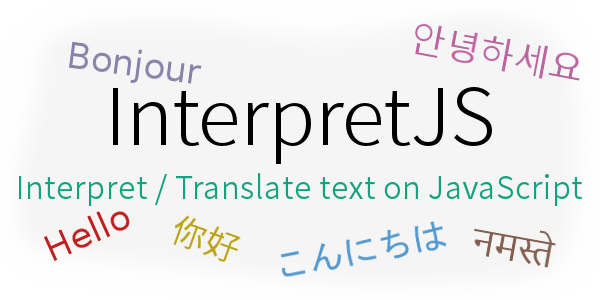interpret-js v0.0.1

InterpretJS
Interpret / Translate text on JavaScript
InterpretJS is easy to use and very fast to translate your webpage on web browser, it also implements by native JavaScript
Note: Current this library only support web browser, npm only for CommenJS
Features
- Interpret / Translate full page or a element
- Use JSON to store the language file
- Auto merge missing fields from default langauage file
- Support Promise and callback style! (Use "promisejs" for basic and compatible with BlueBirdJS, Q and other promise library)
Example & Demo
You can find example demo on the "docs" and "docs/examples" folder
If you want live demo, you can command npm run test on the project folder, then it will pop up a browser view for the demo
Live Demo: https://onikuryh.github.io/interpret-js/
Installation
| Method | Description |
|---|---|
| Script tag | <script type="text/javascript" src="./path/to/interpret.min.js"></script> |
| NPM | npm i -S interpret-js |
| JSPM | jspm npm:interpret-js |
| Bower | bower install --save interpret-js |
Usage
CommonJS
const InterpretJS = require("interpret-js");Global varable
<script type="text/javascript" src="./path/to/interpret.min.js"></script>
<script type="text/javascript">
// Here you can use the InterpretJS library varable
</script>Interpret "body" with langauage code zh-HK (Traditional Chinese)
Script (index.js)
// Any config should be on the top
// Push zh-HK to config
InterpretJS.config.langs.push("zh-HK");
// Create a interpret element for interpret later
var interpretElement = InterpretJS.createForElement(document.body);
// Interpret body with language code "zh-HK"
// Default InterpretJS will load the json file from currentFolder/langs/<langCode>.json
interpretElement.load({ langCode: "zh-HK" }, function (err) {
if (err)
return console.error(err);
console.log("Finished!");
});Language file
langs/en.json (Default language file for merge missing fields)
{
"hello": "hello",
"thisFieldOnlyInEnglish": "This field only in English"
}langs/zh-HK.json
{
"hello": "你好"
}HTML
<html>
<head><!-- ... --></head>
<body>
<!-- Add data-interpret= or interpret= for key -->
<p>
<span style="color: #FA0;" data-interpret="hello"></span>
<span data-interpret="thisFieldOnlyInEnglish"></span>
</p>
<script type="text/javascript" src="./lib/interpret.min.js"></script>
<!-- File content on the below -->
<script type="text/javascript" src="./js/index.js"></script>
</body>
</html>Set langauages from object
var langs = {
en: {
hello: "hello",
thisFieldOnlyInEnglish: "This field only in English"
},
// We can also use "_" instance of "-" /
zh_HK: {
hello: "你好"
}
};
var interpretElement = InterpretJS.createForElement(document.body);
InterpretJS.setLangsFromObject(langs)
.then(function () {
return interpretElement.load({ langCode: "zh_HK" });
})
.then(function () {
console.log("Finished");
})
.catch(function (err) {
console.error(err);
});Set default langauage file to "zh-HK"
InterpretJS.config.defaultLanguage = "zh-HK";Set where the language files to load
InterpretJS.config.languageFilesRoot = "./other/path/langs"Set other available languages
InterpretJS.config.langs.push("zh-HK", "jp-JP", "fr");
// Then here should contain en.json, zh-HK.json, jp-JP.json and, fr.jsonInterpret nested key
HTML
<div data-interpret="nested.object.key"></div>Lanaguage file
{
nested: {
object: {
key: "The nested object key!"
}
}
}API
InterpretJS.config -> Object
Get / Set configs
InterpretJS.config = {
languageFilesRoot: "./langs",
defaultLanguage: "en",
langs: [
"en"
]
}InterpretJS. -> Object
Get current langauage from object or file
console.log(InterpretJS.langs);
/*
{
en: {
// ...
},
"zh-HK": {
// ...
},
// Maybe more ...
}
*/InterpretJS.createForElement(HTMLElement) -> InterpretElement
Create a InterpretElement for interpret later
var interpretElement = InterpretJS.createForElement(document.body);
// Or
var interpretElement = InterpretJS.createForElement(document.getElementById("myElement"));
// Or
var interpretElement = InterpretJS.createForElement(document.querySelector("#myElement > h1.title"));InterpretJS.reloadLanguageFiles(callback) -> Promise
Reload languages from file
InterpretJS.reloadLanguageFiles(function (err) { /*...*/ });
// Or
InterpretJS.reloadLanguageFiles()
.then(function () {
/* ... */
})
.catch(function (err) {
console.error(err);
});InterpretJS.setLangsFromObject(obj, callback) -> Promise
Set languages from object
Note: InterpretJS.reloadLanguageFiles will replace the langauage object set via InterpretJS.setLangsFromObject
var langs = {
en: {
hello: "hello",
thisFieldOnlyInEnglish: "This field only in English"
},
// We can also use "_" instance of "-" /
zh_HK: {
hello: "你好"
}
};
InterpretJS.setLangsFromObject(langs, function (err) {
/* ... */
});
// Or
InterpretJS.setLangsFromObject(langs)
.then(function () {
/* ... */
})
.catch(function (err) {
console.error(err);
});InterpretElement#currentLangCode -> String
Get last InterpretElement#load loaded langCode
console.log(interpretElement.currentLangCode);
// enInterpretElement#load(opts, callback) -> Promise
interpretElement.load({}, function (err) {
/* ... */
});
// Or
interpretElement.load({ langCode: "zh-HK" })
.then(function () {
/* ... */
})
.catch(function (err) {
console.error(err);
});Options (opts)
{
// Which langauage you want to load
langCode = Config.defaultLanguage
}Build
Pre-build requirements
- git
- nodejs >= 6.0
- eslint (Optional)
Open cmd (Windows) or Terminal (Mac OS X / Linux)
cd /where/you/want/to/clone/into
git https://github.com/OnikurYH/interpret-js.git
cd interpret-js
npm install
npm run buildThe script will be build on "dist/" and "docs/lib" folders
Develop by OnikurYH
License: MIT
9 years ago